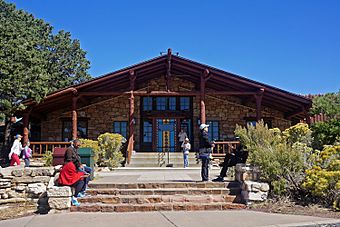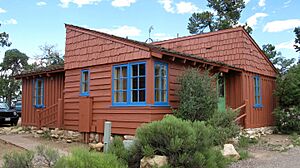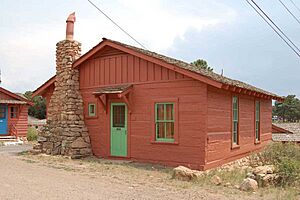Bright Angel Lodge facts for kids
Quick facts for kids |
|
|
Bright Angel Lodge
|
|
|
U.S. Historic district
Contributing property |
|

Main lodge building
|
|
| Location | Grand Canyon Village, Arizona |
|---|---|
| Built | 1935 |
| Architect | Mary Colter et al |
| Architectural style | Rustic |
Bright Angel Lodge is a famous hotel at the Grand Canyon in Arizona. It's located right on the edge of the South Rim of Grand Canyon National Park. The lodge was designed by a well-known architect named Mary Colter. It includes a main building and many small cabins, all built in a rustic style. This historic lodge is an important part of the Grand Canyon Village Historic District.
Contents
History of Bright Angel Lodge
The first place for visitors to stay here was set up in 1896 by James Thurber. It was at the start of the Bright Angel Trail, which leads down into the canyon. Thurber used a stagecoach to bring people to this new spot. He built a small wooden hotel there.
Around the same time, a man named Buckey O'Neill built his own cabin nearby. He called it O'Neill's Camp. Thurber later bought O'Neill's cabin after O'Neill died in a war. Thurber then made his hotel bigger, adding tents for tourists. He called the whole place the Bright Angel Hotel and Bright Angel Camps.
Later, Thurber sold the Bright Angel operation to Martin Buggeln. This happened just as the Grand Canyon Railway was finished in 1901. The railroad bought most of the land at the South Rim, including the Bright Angel site. They worked with Buggeln while their own big hotel, the El Tovar Hotel, was being built.
Once the El Tovar Hotel was finished in 1905, the railroad bought out Buggeln. They fixed up the old Bright Angel Hotel and built cabins to replace the tents. The El Tovar was for fancy travelers, but Bright Angel was for everyday people.
The Red Horse Station was first built as a stagecoach stop about 16 miles (26 km) south of the Grand Canyon. When the railroad came, Ralph Cameron moved it to the South Rim in 1902. He rebuilt it next to the Buckey O'Neill Cabin. He added a second floor made of wood to the original log building. From 1907, this building was used as the park's post office.
By the 1930s, the Bright Angel buildings needed to be updated. The Atchison, Topeka and Santa Fe Railway, which owned the railroad and the hotels, asked architect Mary Colter to design a new lodge. Her first ideas were similar to her other stone buildings nearby, like Hermits Rest and Lookout Studio.
However, the Park Service wanted less stone. So, Mary Colter changed her design to use more wood. She kept the old O'Neill Cabin and the Red Horse Cabin (removing its second floor). She replaced the tents with new, rustic cabins made of logs and local stone. These were finished in 1935. Colter worked hard to make the new buildings fit in with the natural landscape. She even used a small model to plan everything perfectly.
What Bright Angel Lodge Looks Like
The main lodge building is large with a simple, gently sloped roof. The roof extends over the main entrance, creating a porch supported by natural log posts. Mary Colter used different roof styles to make the building look layered.
Inside, you can see hand-carved logs, adobe, and local limestone. The big stone fireplace is very special. It shows the different layers of rock found in the Grand Canyon, just like you would see them along the Bright Angel Trail. The cabins are placed between the main lodge and the canyon rim. Some of them have amazing views of the canyon.
Mary Colter chose antique and reproduction furniture for the cabins herself. The lodge's bar area has beautiful paintings by Hopi artist Fred Kabotie.
Why Bright Angel Lodge is Historic
The Bright Angel Lodge and its cabins are very important historic buildings. They are part of the Grand Canyon Village Historic District, which is a special national landmark. This means the area is protected because of its history.
The historic district was made bigger in 1982 to include Bright Angel Lodge and its cabins. Even though the lodge was not yet 50 years old at that time, it was considered so important that it was added anyway. This shows how special and valuable the Bright Angel complex is.
See also
 In Spanish: Bright Angel Lodge para niños
In Spanish: Bright Angel Lodge para niños




